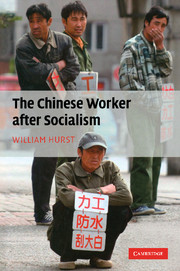Book contents
- Frontmatter
- Contents
- List of illustrations
- Preface
- Introduction
- 1 Regional political economy and labor reform
- 2 The roots of unemployment and the political economy of lay-offs
- 3 Remaking China's urban welfare and labor market policies
- 4 Pathways to re-employment
- 5 Contention, protest, and social order
- Conclusion
- Appendix: List of interviewees
- Bibliography
- Index
Preface
Published online by Cambridge University Press: 02 July 2009
- Frontmatter
- Contents
- List of illustrations
- Preface
- Introduction
- 1 Regional political economy and labor reform
- 2 The roots of unemployment and the political economy of lay-offs
- 3 Remaking China's urban welfare and labor market policies
- 4 Pathways to re-employment
- 5 Contention, protest, and social order
- Conclusion
- Appendix: List of interviewees
- Bibliography
- Index
Summary
As a teenager in the late 1980s to early 1990s, I was a mediocre athlete at a school not known for its sporting prowess. We played our games on New York City Parks Department fields. But this provided a window onto American de-industrialization. Walking to and from games along streets I might not otherwise have ventured down, or looking up from the sidelines or the dugout, I saw the storied but long-neglected Brooklyn Navy Yard, the equally famous but also rusted and crumbling Red Hook factories and piers, and neighborhoods that seemed to have had virtually all economic and social life sucked out from them. Also very much in the spotlight in those years were the disintegration of the Soviet Union, the triumph of Polish Solidarity, and the purported “collapse of communism.” It was this context that sparked my interest in workers' politics in the last days of socialism, an interest further strengthened by even starker examples of de-industrialization I observed in Chicago as an undergraduate.
This book began life as my dissertation project in the Political Science Department at the University of California-Berkeley. When I was a brand new graduate student in 1998, Hong Yung Lee hired me in the fall semester as a research assistant. His assignment to me was to track down and evaluate what social scientists had written about Chinese lay-offs (xiagang) and state-owned enterprise reform. I was astonished to learn that so little had been written about a topic that seemed so significant.
- Type
- Chapter
- Information
- The Chinese Worker after Socialism , pp. vii - xPublisher: Cambridge University PressPrint publication year: 2009

